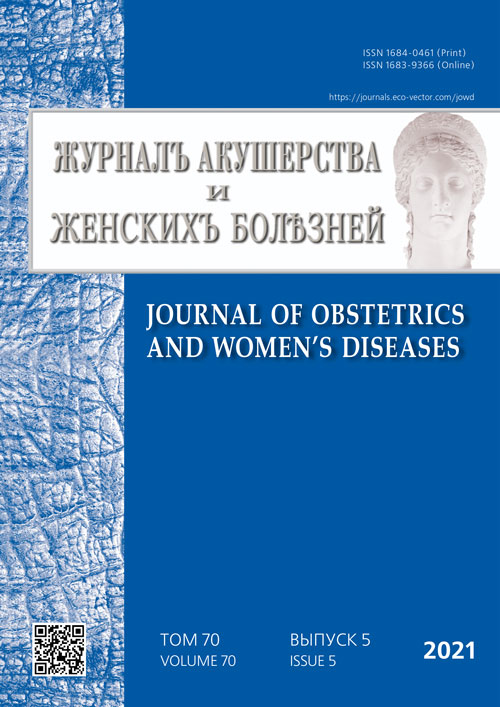Psychological analysis of women’s experiences of late pregnancy termination for fetal anomaly
- 作者: Mikhaylov A.V.1,2,3,4, Zamanayeva Y.V.4
-
隶属关系:
- Research Institute of Obstetrics, Gynecology, and Reproductology named after D.O. Ott
- Academician I.P. Pavlov First St. Petersburg State Medical University
- North-Western State Medical University named after I.I. Mechnikov
- Maternity Hospital No. 17
- 期: 卷 70, 编号 5 (2021)
- 页面: 49-62
- 栏目: Original study articles
- ##submission.dateSubmitted##: 27.04.2021
- ##submission.dateAccepted##: 15.09.2021
- ##submission.datePublished##: 02.11.2021
- URL: https://journals.eco-vector.com/jowd/article/view/65947
- DOI: https://doi.org/10.17816/JOWD65947
- ID: 65947
如何引用文章
详细
AIM: The aim of this study was to conduct a psychological analysis and summarize information on women’s experiences of late pregnancy termination for fetal anomaly.
MATERIALS AND METHODS: The study included 105 patients aged 19 to 43 years who experienced late pregnancy termination for fetal anomaly after 22 weeks of gestation and who received psychological support during their stay in the maternity hospital. The method of data collection involved structured clinical interview with subsequent analysis and summarizing the information received. The data obtained were compared with the literature, thus leading to a conclusion about long-term psychological consequences after late pregnancy termination.
RESULTS: The general psychological patterns of women’s experiencing of several consequential steps of late pregnancy termination were revealed: during the primary diagnosis, in the decision-making process, during the feticide procedure, during delivery, and in the postpartum period. The tasks of psychological support were formulated; the types of reasons for termination decision were described; the key influence of the psychological status of the fetus on the subjective character of experience was determined. The analysis of foreign issues was made and faraway traumatic consequences of late pregnancy termination for the woman and her family were depicted.
CONCLUSIONS: Late pregnancy termination is a traumatic choice for a woman and her family and it has medical, psychological, ethical and legal contexts. Psychological maintenance can optimize the patient’s contact with the medical staff during her stay in the maternity hospital. Psychologically conceived experience ensure a constructive attitude towards the future pregnancy and its positive conditions.
全文:
作者简介
Anton Mikhaylov
Research Institute of Obstetrics, Gynecology, and Reproductology named after D.O. Ott; Academician I.P. Pavlov First St. Petersburg State Medical University; North-Western State Medical University named after I.I. Mechnikov; Maternity Hospital No. 17
编辑信件的主要联系方式.
Email: mav080960@gmail.com
ORCID iD: 0000-0002-0343-8820
Scopus 作者 ID: 18042427700
MD, Dr. Sci. (Med.), Professor
俄罗斯联邦, Saint PetersburgYulia Zamanayeva
Maternity Hospital No. 17
Email: jzamanaeva@mail.ru
Cand. Sci. (Psychol.)
俄罗斯联邦, Saint Petersburg参考
- Robinson M, Baker L, Nackerud L. The relationship of attachment theory and perinatal loss. Death Stud. 1999;23(3):257−270. doi: 10.1080/074811899201073
- White-van Mourik MC, Connor JM, Ferguson-Smith MA. The psychosocial sequelae of a second-trimester termination of pregnancy for fetal abnormality. Prenat Diagn. 1992;12(3):189−204. doi: 10.1002/pd.1970120308
- Davies V, Gledhill J, McFadyen A, et al. Psychological outcome in women undergoing termination of pregnancy for ultrasound-detected fetal anomaly in the first and second trimesters: a pilot study. Ultrasound Obstet Gynecol. 2005;25(4):389−392. doi: 10.1002/uog.1854
- Rakitina E. Issledovanie psikhologicheskogo statusa zhenshchin, perenesshikh meditsinskiy abort na razlichnykh srokakh beremennosti po raznym pokazaniyam. Perinatal’naya psikhologiya i psi-khologiya roditel’stva. 2012;(3):24–34. (In Russ.)
- Brutman VI, Radionova MS. Formirovanie privyazannosti materi k rebenku v period beremennosti. Voprosy psikhologii. 1997;(6):38−47. (In Russ.)
- Kopyl OA, Bazhenova OV, Baz LL. Vydelenie faktorov i usloviy psikhologicheskogo riska dlya budushchego razvitiya rebenka. Sinaps. 1994;(5):15−28. (In Russ.)
- Stern DN, Bruschweiler-Stern N. The birth of a mother. N.Y.: Basic Books; 1998.
- Blokh ME. Perezhivanie utraty obraza rebenka v situatsii vyyavleniya porokov razvitiya ploda. Zhurnal akusherstva i zhenskikh bolezney. 2015;64(Suppl):17−18. (In Russ.)
- Côté-Arsenault D, Denney-Koelsch E. “Have no regrets:” Parents’ experiences and developmental tasks in pregnancy with a lethal fetal diagnosis. Soc Sci Med. 2016;154:100−109. doi: 10.1016/j.socscimed.2016.02.033
- Lalor J, Begley CM, Galavan E. Recasting hope: a process of adaptation following fetal anomaly diagnosis. Soc Sci Med. 2009;68(3):462−472. doi: 10.1016/j.socscimed.2008.09.069
- DiMiceli-Zsigmond M, Williams AK, Richardson MG. Expecting the unexpected: perspectives on stillbirth and late termination of pregnancy for fetal anomalies. Anesth Analg. 2015;121(2):457−464. doi: 10.1213/ANE.0000000000000785
- Benute GR, Nomura RM, Liao AW, et al. Feelings of women regarding end-of-life decision making after ultrasound diagnosis of a lethal fetal malformation. Midwifery. 2012;28(4):472−475. doi: 10.1016/j.midw.2011.06.011
- Govender L, Ndjapa-Ndamkou C, Aldous C, Moodley J. A pilot study of women’s experiences after being offered late termination of pregnancy for severe fetal anomaly. Niger J Clin Pract. 2015;18 Suppl:S71−S76. doi: 10.4103/1119-3077.170825
- Korenromp MJ, Page-Christiaens GC, van den Bout J, et al. Maternal decision to terminate pregnancy in case of Down syndrome. Am J Obstet Gynecol. 2007;196(2):149.e1−11. doi: 10.1016/j.ajog.2006.09.013
- Seligman M, Darling RB. Obychnye sem’i, osobye deti. Moscow: Terevinf; 2013.
- Fay V, Thomas S, Slade P. Maternal-fetal medicine specialists’ experiences of conducting feticide as part of termination of pregnancy: a qualitative study. Prenat Diagn. 2016;36(1):92−99. doi: 10.1002/pd.4720
- Mikhaylov AV, Zamanaeva YuV. Psikhologiya perezhivaniya antenatal’nykh poter’. In: Plod i novorozhdennyy kak patsienty. Saint Petersburg: Petropolis; 2015. P. 696−703. (In Russ.)
- Korenromp MJ, Page-Christiaens GC, van den Bout J, et al. Adjustment to termination of pregnancy for fetal anomaly: a longitudinal study in women at 4, 8, and 16 months. Am J Obstet Gynecol. 2009;201(2):160−167. doi: 10.1016/j.ajog.2009.04.007
- Elder SH, Laurence KM. The impact of supportive intervention after second trimester termination of pregnancy for fetal abnormality. Prenat Diagn. 1991;11(1):47−54. doi: 10.1002/pd.1970110109
- Nazaré B, Fonseca A, Canavarro MC. Trauma following termination of pregnancy for fetal abnormality: is this the path from guilt to grief? Journal of Loss and Trauma. 2014;19(3):244−261. doi: 10.1080/15325024.2012.743335
- Dobryakov IV, Blokh ME, Faerberg LM. Perinatal loss: psychological aspects, the specificity of mourning, forms of psychological help. Journal of obstetrics and women’s diseases. 2015;64(3):4−10. (In Russ.). doi: 10.17816/JOWD6434-10
- Kosterina EM. Psikhologicheskoe soprovozhdenie perinatal’nykh poter’. Perinatal’naya psikhologiya i psikhologiya roditel’stva. 2004;(2):94−107. (In Russ.)
补充文件





